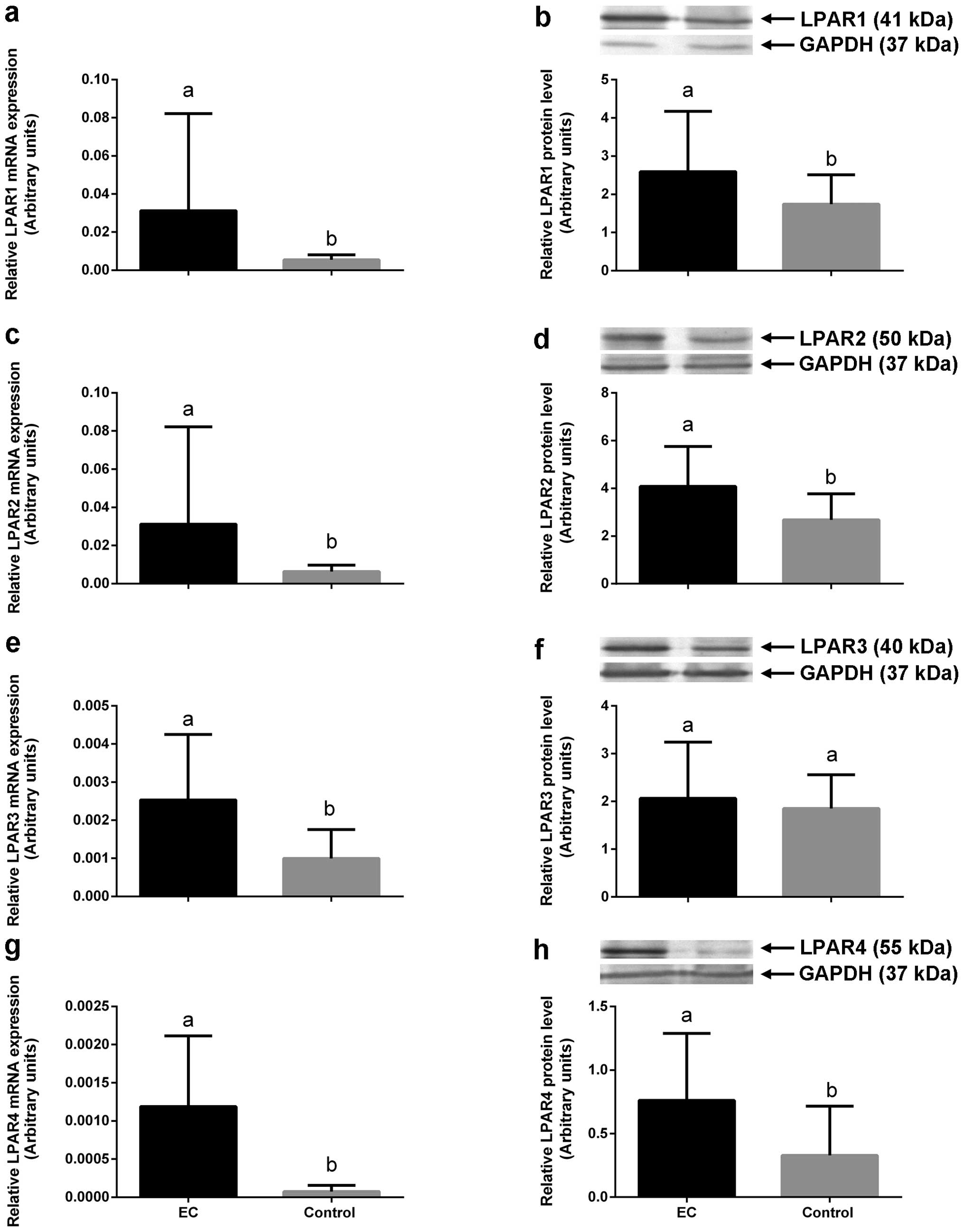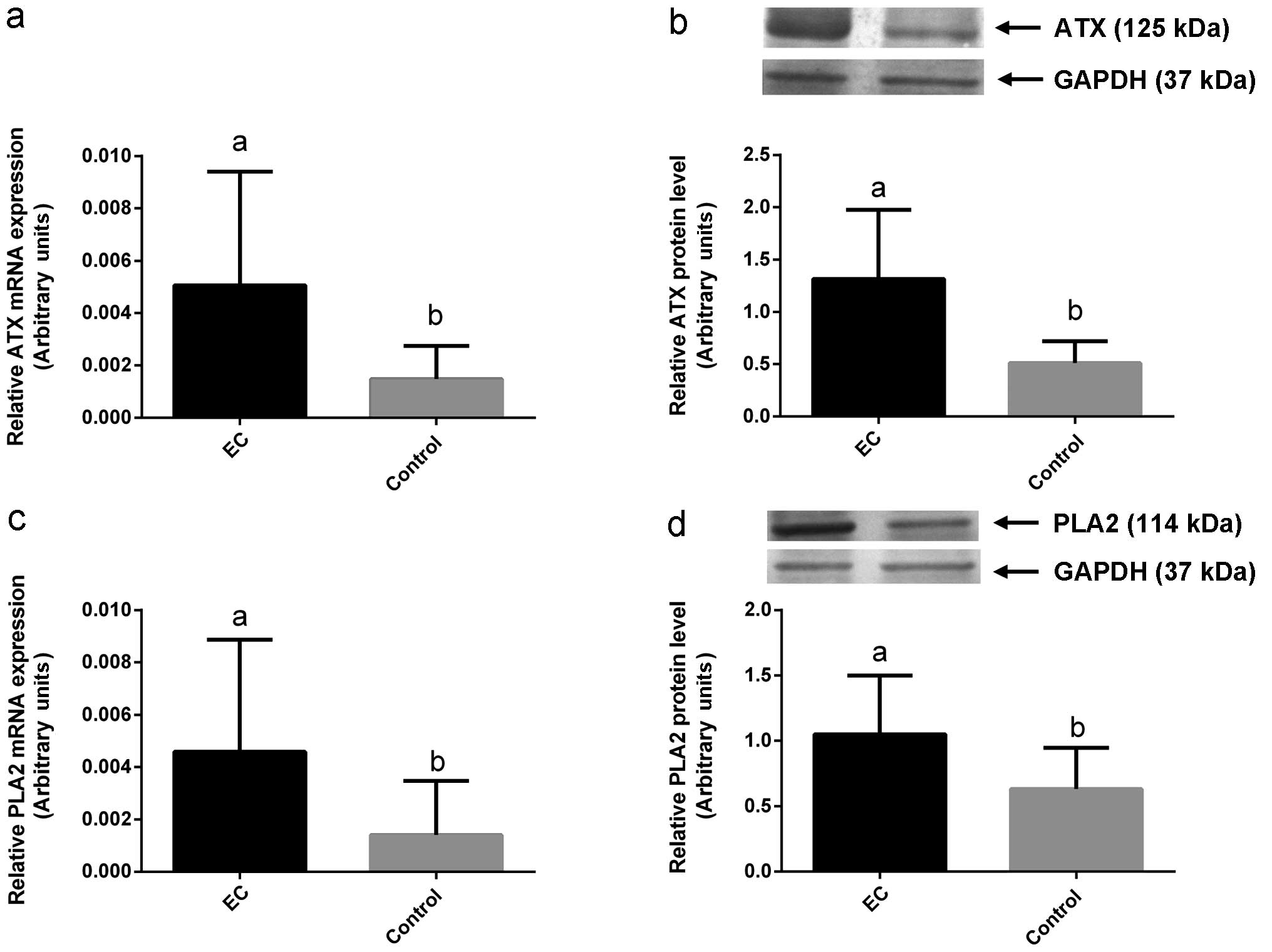|
1
|
Didkowska J, Wojciechowska U, Tarkowski W
and Zatoński W: Cancer in Poland in 2009. Polish National Cancer
Registry. Department of Epidemiology and Cancer Prevention. The
Maria Skłodowska-Curie Memorial Cancer Center; Warsaw: 2011
|
|
2
|
Schouten LJ, Goldbohm RA and van den
Brandt PA: Anthropometry, physical activity, and endometrial cancer
risk: Results from the Netherlands Cohort Study. J Natl Cancer
Inst. 96:1635–1638. 2004. View Article : Google Scholar : PubMed/NCBI
|
|
3
|
Bokhman JV: Two pathogenetic types of
endometrial carcinoma. Gynecol Oncol. 15:10–17. 1983. View Article : Google Scholar : PubMed/NCBI
|
|
4
|
Parazzini F, La Vecchia C, Bocciolone L
and Franceschi S: The epidemiology of endometrial cancer. Gynecol
Oncol. 41:1–16. 1991. View Article : Google Scholar : PubMed/NCBI
|
|
5
|
Potischman N, Hoover RN, Brinton LA,
Siiteri P, Dorgan JF, Swanson CA, Berman ML, Mortel R, Twiggs LB,
Barrett RJ, et al: Case-control study of endogenous steroid
hormones and endometrial cancer. J Natl Cancer Inst. 88:1127–1135.
1996. View Article : Google Scholar : PubMed/NCBI
|
|
6
|
Zeleniuch-Jacquotte A, Akhmedkhanov A,
Kato I, Koenig KL, Shore RE, Kim MY, Levitz M, Mittal KR, Raju U,
Banerjee S, et al: Postmenopausal endogenous oestrogens and risk of
endometrial cancer: Results of a prospective study. Br J Cancer.
84:975–981. 2001. View Article : Google Scholar : PubMed/NCBI
|
|
7
|
Park CK, Apte S, Acs G and Harris EER:
Cancer endometrium. Abeloff's Clinical Oncology. Abeloff M,
Armitage J, Niederhuber J, Kastan M and McKenna W: 4th edition.
Elsevier; Philadelphia: 2008, View Article : Google Scholar
|
|
8
|
Ye X and Chun J: Lysophosphatidic acid
(LPA) signaling in vertebrate reproduction. Trends Endocrinol
Metab. 21:17–24. 2010. View Article : Google Scholar :
|
|
9
|
Aoki J: Mechanisms of lysophosphatidic
acid production. Semin Cell Dev Biol. 15:477–489. 2004. View Article : Google Scholar : PubMed/NCBI
|
|
10
|
Okudaira S, Yukiura H and Aoki J:
Biological roles of lysophosphatidic acid signaling through its
production by autotaxin. Biochimie. 92:698–706. 2010. View Article : Google Scholar : PubMed/NCBI
|
|
11
|
Billon-Denis E, Tanfin Z and Robin P: Role
of lysophosphatidic acid in the regulation of uterine leiomyoma
cell proliferation by phospholipase D and autotaxin. J Lipid Res.
49:295–307. 2008. View Article : Google Scholar
|
|
12
|
Hope JM, Wang FQ, Whyte JS, Ariztia EV,
Abdalla W, Long K and Fishman DA: LPA receptor 2 mediates
LPA-induced endometrial cancer invasion. Gynecol Oncol.
112:215–223. 2009. View Article : Google Scholar
|
|
13
|
Wang FQ, Ariztia EV, Boyd LR, Horton FR,
Smicun Y, Hetherington JA, Smith PJ and Fishman DA:
Lysophosphatidic acid (LPA) effects on endometrial carcinoma in
vitro proliferation, invasion, and matrix metalloproteinase
activity. Gynecol Oncol. 117:88–95. 2010. View Article : Google Scholar : PubMed/NCBI
|
|
14
|
Zhao S and Fernald RD: Comprehensive
algorithm for quantitative real-time polymerase chain reaction. J
Comput Biol. 12:1047–1064. 2005. View Article : Google Scholar : PubMed/NCBI
|
|
15
|
Bradford MM: A rapid and sensitive method
for the quantitation of microgram quantities of protein utilizing
the principle of protein-dye binding. Anal Biochem. 72:248–254.
1976. View Article : Google Scholar : PubMed/NCBI
|
|
16
|
Sun X, Cheng G, Hao M, Zheng J, Zhou X,
Zhang J, Taichman RS, Pienta KJ and Wang J: CXCL12 / CXCR4 / CXCR7
chemokine axis and cancer progression. Cancer Metastasis Rev.
29:709–722. 2010. View Article : Google Scholar : PubMed/NCBI
|
|
17
|
Llauradó M, Ruiz A, Majem B, Ertekin T,
Colás E, Pedrola N, Devis L, Rigau M, Sequeiros T, Montes M, et al:
Molecular bases of endometrial cancer: New roles for new actors in
the diagnosis and the therapy of the disease. Mol Cell Endocrinol.
358:244–255. 2012. View Article : Google Scholar
|
|
18
|
Jereczek-Fossa B, Badzio A and Jassem J:
Surgery followed by radiotherapy in endometrial cancer: Analysis of
survival and patterns of failure. Int J Gynecol Cancer. 9:285–294.
1999. View Article : Google Scholar
|
|
19
|
Xu Y, Shen Z, Wiper DW, Wu M, Morton RE,
Elson P, Kennedy AW, Belinson J, Markman M and Casey G:
Lysophosphatidic acid as a potential biomarker for ovarian and
other gynecologic cancers. JAMA. 280:719–723. 1998. View Article : Google Scholar : PubMed/NCBI
|
|
20
|
Shen Z, Belinson J, Morton RE and Xu Y and
Xu Y: Phorbol 12-myristate 13-acetate stimulates lysophosphatidic
acid secretion from ovarian and cervical cancer cells but not from
breast or leukemia cells. Gynecol Oncol. 71:364–368. 1998.
View Article : Google Scholar
|
|
21
|
Fang X, Gaudette D, Furui T, Mao M,
Estrella V, Eder A, Pustilnik T, Sasagawa T, Lapushin R, Yu S, et
al: Lysophospholipid growth factors in the initiation, progression,
metastases, and management of ovarian cancer. Ann NY Acad Sci.
905:188–208. 2000. View Article : Google Scholar : PubMed/NCBI
|
|
22
|
Choi JW, Herr DR, Noguchi K, Yung YC, Lee
CW, Mutoh T, Lin ME, Teo ST, Park KE, Mosley AN, et al: LPA
receptors: Subtypes and biological actions. Annu Rev Pharmacol
Toxicol. 50:157–186. 2010. View Article : Google Scholar : PubMed/NCBI
|
|
23
|
Xiao Y, Chen Y, Kennedy AW, Belinson J and
Xu Y: Evaluation of plasma lysophospholipids for diagnostic
significance using electrospray ionization mass spectrometry
(ESI-MS) analyses. Ann NY Acad Sci. 905:242–259. 2000. View Article : Google Scholar : PubMed/NCBI
|
|
24
|
Xiao YJ, Schwartz B, Washington M, Kennedy
A, Webster K, Belinson J and Xu Y: Electrospray ionization mass
spectrometry analysis of lysophospholipids in human ascitic fluids:
Comparison of the lysophospholipid contents in malignant vs
nonmalignant ascitic fluids. Anal Biochem. 290:302–313. 2001.
View Article : Google Scholar : PubMed/NCBI
|
|
25
|
Yoon HR, Kim H and Cho SH: Quantitative
analysis of acyl-lysophosphatidic acid in plasma using negative
ionization tandem mass spectrometry. J Chromatogr B Analyt Technol
Biomed Life Sci. 788:85–92. 2003. View Article : Google Scholar : PubMed/NCBI
|
|
26
|
Goetzl EJ, Kong Y and Mei B:
Lysophosphatidic acid and sphingosine 1-phosphate protection of T
cells from apoptosis in association with suppression of Bax. J
Immunol. 162:2049–2056. 1999.PubMed/NCBI
|
|
27
|
Furui T, LaPushin R, Mao M, Khan H, Watt
SR, Watt MA, Lu Y, Fang X, Tsutsui S, Siddik ZH, et al:
Overexpression of edg-2/vzg-1 induces apoptosis and anoikis in
ovarian cancer cells in a lysophosphatidic acid-independent manner.
Clin Cancer Res. 5:4308–4318. 1999.
|
|
28
|
Yu S, Murph MM, Lu Y, Liu S, Hall HS, Liu
J, Stephens C, Fang X and Mills GB: Lysophosphatidic acid receptors
determine tumorigenicity and aggressiveness of ovarian cancer
cells. J Natl Cancer Inst. 100:1630–1642. 2008. View Article : Google Scholar : PubMed/NCBI
|
|
29
|
Hu YL, Tee MK, Goetzl EJ, Auersperg N,
Mills GB, Ferrara N and Jaffe RB: Lysophosphatidic acid induction
of vascular endothelial growth factor expression in human ovarian
cancer cells. J Natl Cancer Inst. 93:762–768. 2001. View Article : Google Scholar : PubMed/NCBI
|
|
30
|
Fujita T, Miyamoto S, Onoyama I, Sonoda K,
Mekada E and Nakano H: Expression of lysophosphatidic acid
receptors and vascular endothelial growth factor mediating
lysophosphatidic acid in the development of human ovarian cancer.
Cancer Lett. 192:161–169. 2003. View Article : Google Scholar : PubMed/NCBI
|
|
31
|
Renehan AG, Tyson M, Egger M, Heller RF
and Zwahlen M: Body-mass index and incidence of cancer: A
systematic review and meta-analysis of prospective observational
studies. Lancet. 371:569–578. 2008. View Article : Google Scholar : PubMed/NCBI
|
|
32
|
Crosbie EJ, Zwahlen M, Kitchener HC, Egger
M and Renehan AG: Body mass index, hormone replacement therapy, and
endometrial cancer risk: A meta-analysis. Cancer Epidemiol
Biomarkers Prev. 19:3119–3130. 2010. View Article : Google Scholar : PubMed/NCBI
|
|
33
|
Everett E, Tamimi H, Greer B, Swisher E,
Paley P, Mandel L and Goff B: The effect of body mass index on
clinical/pathologic features, surgical morbidity, and outcome in
patients with endometrial cancer. Gynecol Oncol. 90:150–157. 2003.
View Article : Google Scholar : PubMed/NCBI
|
|
34
|
Martra F, Kunos C, Gibbons H, Zola P,
Galletto L, DeBernardo R and von Gruenigen V: Adjuvant treatment
and survival in obese women with endometrial cancer: An
international collaborative study. Am J Obstet Gynecol.
198:89.e1–89.e8. 2008. View Article : Google Scholar
|
|
35
|
Münstedt K, Wagner M, Kullmer U, Hackethal
A and Franke FE: Influence of body mass index on prognosis in
gynecological malignancies. Cancer Causes Control. 19:909–916.
2008. View Article : Google Scholar : PubMed/NCBI
|
|
36
|
Litta P, Di Giuseppe J, Moriconi L, Delli
Carpini G, Piermartiri MG and Ciavattini A: Predictors of
malignancy in endometrial polyps: A multi-institutional cohort
study. Eur J Gynaecol Oncol. 35:382–386. 2014.PubMed/NCBI
|
|
37
|
Nevadunsky NS, Van Arsdale A, Strickler
HD, Moadel A, Kaur G, Levitt J, Girda E, Goldfinger M, Goldberg GL
and Einstein MH: Obesity and age at diagnosis of endometrial
cancer. Obstet Gynecol. 124:300–306. 2014. View Article : Google Scholar : PubMed/NCBI
|
















